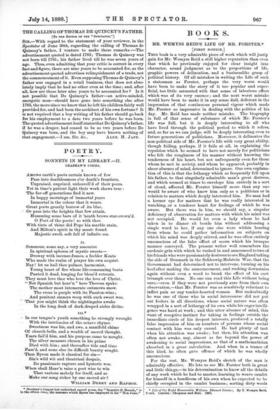POE T] Y.
SONNETS IN MY LIBRARY.—II.
CRASHAW'S TOEMS.
I.
AMONG earth's poets certain known of few
Pass into deathlessness o'er death's frontiers, 17npraised, unprized, unlaurell'd of their peers.
Yet in time's patient light their work shows true : The far-off generations find it new.
In happy mornings of immortal years Immortal is the colour that it wears.
Great poets greatly borrow of its blue, -Or pass into the heights that few attain, Humming some bars of it 'neath brows star-crown'd.
0 Poet of the poets ! so with thee.
With tints of thine did Pope his marble stain, And Milton's spirit in thy music found Majestic swell, soft fall of infinite sea.
Sensuous, some say, a very amourist In spiritual spheres of mystic sweets— Drowsy with incense-fumes, a feebler Keats Who made the realm of prayer his own acquist.
Nay ! let us hail thee palmer, harmonist, Young heart of fire whose life-consuming beats Panted it dead, longing for bless'd retreats.
They must love thee who love the love of Christ.
4‘ Not Spanish but heav'n " here Theresa spake. The mother most intemerate outsnows snow.
The cross is purple with its Passion-wine ; And penitent sinners weep with such sweet woe, sl'hat you might think the nightingales awake In the long dusk of dark-draped aisles divine.
• In our tongue's youth something he strongly wrought With the intricacies of the octave rhyme.
Sweetness was his, and awe, a manifold chime .0f church-bells, and a wealth of sacred thought.
Years fall'd him, and his purpose came to nought.
The silver measure chosen in his prime Died with him; and thereafter tide and time Pass'd, and none else its difficult beauty sought.
when Byron made it classical for sin—
Sin's wild wit and theatrical despair, Its passionate rapture and hysteric woe.
When shall Heav'n raise a poet wise to win That various melody for itself, and so Make our song richer by one sacred air ?
WILLIAM DERRY AND RAPHOE.
Oraehaw's longest but unfinished sacred poem, the "Sospetto di Herode„" is in the .ottava rim; the measure which Byron has employed in his" Da Juan."


































 Previous page
Previous page